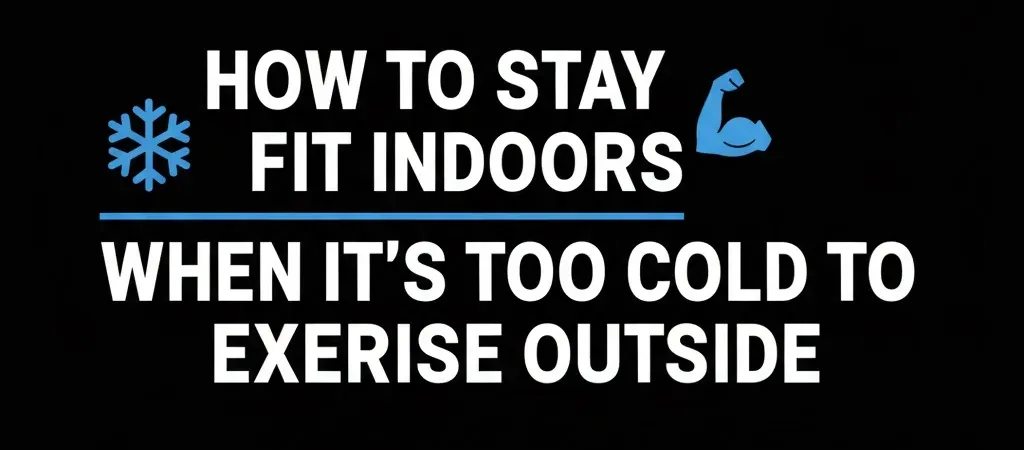Cold weather can make outdoor workouts challenging, but staying active indoors is completely possible. When temperatures drop, motivation often follows, yet your body still needs movement to stay healthy and strong. Indoor fitness doesn’t require special equipment or large spaces—just commitment and creativity. With simple exercises, household routines, and bodyweight movements, you can maintain strength, flexibility, and energy through the cold months. Here’s how to stay fit indoors even when outdoor conditions make it difficult to move.
How to Stay Fit Indoors When It’s Too Cold to Exercise Outside
1. Create a Small Workout Space
Clear an area in your living room or bedroom where you can move freely. Even a space large enough to stretch your arms in all directions works. A mat, towel, or rug can serve as your base for all workouts.
2. Warm Up Properly
Cold temperatures tighten muscles, increasing injury risk. Spend five to seven minutes warming up. March in place, do light arm circles, or jog indoors to raise your body temperature before starting any exercise routine.
3. Focus on Bodyweight Exercises
Bodyweight workouts are ideal for indoor fitness. They strengthen major muscles, improve balance, and burn calories without equipment. Start with push-ups, squats, planks, lunges, and mountain climbers. These compound movements target multiple muscle groups effectively.
Simple No-Equipment Workout Plan
| Exercise | Duration/Reps | Muscle Focus |
|---|---|---|
| Jumping Jacks | 1 minute | Full body |
| Squats | 15 reps | Legs and glutes |
| Push-Ups | 10–15 reps | Arms and chest |
| Plank | 30 seconds | Core stability |
| Lunges | 10 each leg | Lower body balance |
4. Try Indoor Cardio Options
You don’t need a treadmill to do cardio indoors. Try stair climbing, skipping rope, or jogging in place. Dance workouts are also fun and effective for keeping your heart rate up while burning calories.
5. Incorporate Strength Training
If you have light weights or resistance bands, add them to your workouts. Strength training prevents muscle loss during inactivity and keeps your metabolism active. Household items like water bottles, books, or filled bags can substitute for weights.
6. Stretch to Stay Flexible
Cold weather makes joints stiff. Gentle stretching helps maintain flexibility and prevents discomfort. Spend 10 minutes daily on stretches for your neck, shoulders, hips, and legs. Include yoga or pilates movements to lengthen and relax muscles.
Indoor Stretch Routine
| Stretch | Duration | Benefit |
|---|---|---|
| Neck Tilt | 20 seconds | Reduces tension |
| Shoulder Roll | 30 seconds | Improves mobility |
| Hamstring Stretch | 30 seconds | Loosens leg muscles |
| Cat-Cow Pose | 1 minute | Improves spine flexibility |
| Standing Side Reach | 30 seconds | Expands rib and core mobility |
7. Follow Online Fitness Videos
There are thousands of free workout sessions available online. Choose short routines based on your fitness goals—strength, yoga, dance, or low-impact training. Following guided videos adds structure, motivation, and variety to your workouts.
8. Add Movement Throughout the Day
If you don’t have time for a full workout, stay active through small actions. Walk around during phone calls, take the stairs, or do squats while watching TV. Movement spread throughout the day keeps your metabolism active.
9. Use Music for Motivation
Play upbeat songs to lift your mood and energy. Music makes exercise more enjoyable and helps maintain rhythm during cardio or stretching sessions.
10. Keep a Regular Schedule
Cold weather can disrupt routine. Choose a specific time daily for your indoor workout—morning, afternoon, or evening. Consistency builds discipline and makes exercise a normal part of your day.
Sample 20-Minute Indoor Routine
| Segment | Activity | Duration |
|---|---|---|
| Warm-Up | Jog in place + Arm swings | 3 minutes |
| Main Workout | Squats, Push-ups, Lunges | 12 minutes |
| Core & Balance | Plank + Side Plank | 3 minutes |
| Cool Down | Stretch or Yoga Pose | 2 minutes |
11. Practice Yoga or Meditation
Yoga strengthens muscles, improves posture, and relieves winter stiffness. Meditation combined with deep breathing also reduces stress and improves focus, which benefits overall health.
12. Track Your Progress
Record your workouts in a notebook or mobile app. Note duration, intensity, or calories burned. Tracking progress keeps you accountable and motivates you to stay consistent.
13. Stay Hydrated and Eat Smart
Cold weather often reduces thirst, but hydration remains vital. Drink water regularly and eat balanced meals rich in protein, fiber, and vitamins. Proper nutrition supports energy and recovery from workouts.
14. Keep Your Indoor Space Comfortable
Warm air keeps your muscles flexible. Avoid exercising near cold drafts. Proper lighting and ventilation make your indoor workouts more inviting.
15. Rest and Recover
Allow your body time to recover between workouts. Overtraining indoors can cause stiffness and fatigue. Get enough sleep to help your muscles repair and grow stronger.
FAQs
1. Can indoor workouts replace outdoor exercise?
Yes, consistent indoor training can maintain strength, flexibility, and fitness all year round.
2. What’s the best short workout for small spaces?
Planks, squats, and jumping jacks work well even in limited space.
3. How can I avoid boredom during indoor exercise?
Rotate between cardio, stretching, and dance routines to keep things fresh.
4. Can I lose weight with indoor workouts?
Yes, combining bodyweight training with a balanced diet can support healthy weight loss.
5. How long should an indoor session last?
Aim for 20–30 minutes of focused activity at least five days a week.
6. Do I need equipment for indoor fitness?
No, your body weight is enough for most exercises, though resistance bands can add variety.
Conclusion
Cold weather doesn’t have to pause your fitness goals. With small adjustments, simple exercises, and consistent habits, you can stay active indoors all season. Focus on bodyweight routines, stretching, and steady movement throughout the day. Staying fit is less about location and more about effort and consistency. A warm, comfortable indoor space can keep your strength, flexibility, and motivation alive even in winter.








